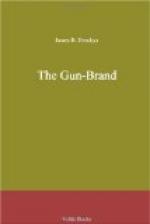“My scows carrying MacNair’s freight!” cried the man, and motioning her to accompany him he walked rapidly to the bank where lay the four or five pieces, upon which Chloe had read the name. Lapierre dropped to his knees and regarded the pieces intently, suddenly he leaped to his feet with a laugh and called in the Indian tongue to one of his canoemen. The man brought him an ax, and raising it high, Lapierre brought it crashing upon the innocent-looking freight piece. There was a sound of smashing staves, a gurgle of liquid, and the strong odour of whiskey assailed their nostrils.
The piece was a keg, cunningly disguised as to shape, and covered with burlap. One by one the man attacked the other pieces marked with the name of MacNair, and as each cask was smashed, the whiskey gurgled and splashed and seeped into the ground. Chloe watched breathlessly until Lapierre finished, and with a smile of grim satisfaction, tossed the ax upon the ground.
“There is one consignment of firewater that will never be delivered,” he said.
“What does it mean?” asked Chloe, and Lapierre noticed that her eyes were alight with interest. “Who is this MacNair, and——”
For answer Lapierre took her gently by the arm and led her back to the log.
“MacNair,” he began, “is the most atrocious tyrant that ever breathed. Like myself, he is a free-trader—that is, he is not in the employ of the Hudson Bay Company. He is rich, and owns a permanent post of his own, to the northward, on Snare Lake, while I vend my wares under God’s own canopy, here and there upon the banks of lakes and rivers.”
“But why should he attack you?”
The man shrugged. “Why? Because he hates me. He hates any one who deals fairly with the Indians. His own Indians, a band of the Yellow Knives, together with an onscouring of Tantsawhoots, Beavers, Dog-ribs, Strongbows, Hares, Brushwoods, Sheep, and Huskies, he holds in abject peonage. Year in and year out he forces them to dig in his mines for their bare existence. Over on the Athabasca they call him Brute MacNair, and among the Loucheaux and Huskies he is known as The-Bad-Man-of-the-North.
“He pays no cash for labour, nor for fur, and he sees to it that his Indians are always hopelessly in his debt. He trades them whiskey. They are his. His to work, and to cheat, and to debauch, and to vent his rage upon—for his passions are the wild, unbridled passions of the fighting wolf. He kills! He maims! Or he allows to live! The Indians are his, body and soul. Their wives and their children are his. He owns them. He is the law!
“He warned me out of the North. I ignored that warning. The land is broad and free. There is room for all, therefore I brought in my goods and traded. And, because I refused to grind the poor savages under the iron heel of oppression, because I offer a meagre trifle over and above what is necessary for their bare existence, the brute hates me. He came upon me at Fort Rae, and there, in the presence of the factor, his clerk, and his chief trader, he fell upon me and beat me so that for three days I lay unable to travel.”




